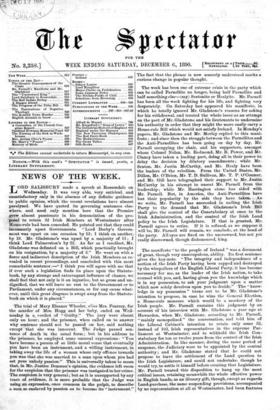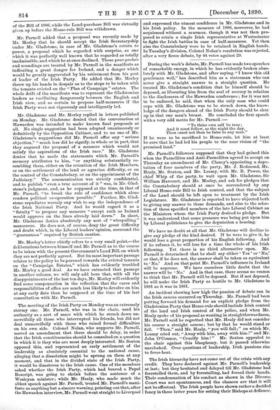The manifesto " to the people of Ireland "- was
a document of great, though very unscrupulous, ability. Its first sentence gives the key-note. " The integrity and independence of a section of, the Irish Party having been sapped and destroyed by the wirepullers of the English Liberal Party, it has become necessary for me, as the leader of the Irish nation, to take counsel with you, and, having given you the knowledge which is in my possession, to ask your judgment upon a matter which now solely devolves upon you to decide." The " know- ledge in my possession " turns out to be Mr. Gladstone's intention to propose, in case he wins the General Election, a Home-rule measure which would be a mockery of the Irish people. Mr. Parnell sustains this judgment by an account of his interview with Mr. Gladstone a year ago at Hawarden, when Mr. Gladstone, according to Mr. Parnell, " mainly monopolised " the conversation, and told him of the -Liberal Cabinet's intention to retain only some 32, instead of 103, Irish representatives in the supreme Par- liament at Westminster, and to withhold the Irish Con- stabulary for ten or twelve years from the control of the Irish Administration. In like manner, during the same period of suspense, the Judiciary were to be appointed by the central authority ; and Mr. Gladstone 'stated that he could not propose to leave the settlement of the Land question to the Irish Legislature, and could not undertake, though he would try, to settle it himself before creating that Legislature. Mr. Parnell treated this disposition to hang up the most critical issues, retaining meanwhile the whole effective power in English hands, as an illusory gift, though, except as regards Land-purchase, the same suspending provisions, accompanied by no representation at all at Westminster, had been features of the Bill of 1886, while the Land-purchase Bill was virtually given up before the Home-rule Bill was withdrawn.























































 Previous page
Previous page